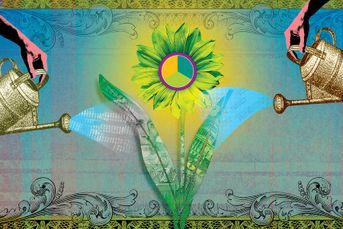The crisis adviser is a leader

Your response to COVID-19 will be remembered for years to come
The old saw is that great leaders are made not born — made of circumstances they did not create but which they faced head on. At home, in New York City, on Sept. 11, 2001, fellow residents and I witnessed acts of great heroism, selfless sacrifice and caring. We also saw ordinary citizens take charge, lead others to safety and calm frightened neighbors. These were unexpected leaders, people called by unimaginable events who somehow found the courage to step up and step in. They didn’t hesitate, and countless people were saved as a result of their leadership.
The coronavirus crisis is a 9/11 moment for the financial advice industry. Our individual and collective response will be remembered for years to come by clients and colleagues who are now very worried — some terrified — about what will happen to their retirement lives or their jobs. This is not about account values, it is about what those values mean for the future. Does a “limit down” in the market mean I have 5% less money, or am I standing on the edge of a trend that steals my retirement dream? Does working remotely imperil a critical project I had underway or put me farther out of sight of a new boss who may be asked to cut costs?
The most important role of anyone entrusted with the honor of serving clients or to be the manager of any employees is to provide every one of those people with the gift of calm. Calming their fears does not mean solving for concerns we cannot resolve now with imperfect information. It means first getting in contact and then listening. For advisers, consider the clients sweating the market drop. Who are they talking to while self-distancing surrounded by family members? Do they really want to share their fears? Likewise for employees in the advice industry, many of whom are already under pressure as commissions and fees have dropped to zero, now followed by interest rates. Will the industry emerge unscathed? Unlikely. And they know it.
You do not need to know how the war will end in order to be a great leader in the fight. True leadership does not think about how the story will be written after the battle. The job is to be incredibly, obviously visible and in the moment. The antidote to unrelenting television and social media coverage is a human conversation and the ability to share feelings and stop the bombardment of television and social media.
For now, listen to those natural feelings of concern — feelings of empathy — that have provided you the opportunity to lead others. Your ability to connect is currently limited to telephone, text, email and video conference, but so what? Make the best of the tools and make the connections. Here are a few reminders of what business leaders and top advisers have done in the past and are doing now:
Be an environmental realist. Telling people not to panic as markets near a 33% sell-off is unrealistic. Let emotions flow. I remember a client in October 1987 calling me in tears. She had no experience with a market drop and had no idea what it meant, only that it sounded horrible: Black Monday. She was young enough to be able to stay the course, but an older client has fewer options. People react differently to crises. There are people who can listen and process, and others race to the store and hoard toilet paper. Suppress your left brain for awhile. Know what’s happening, acknowledge and let clients tell you and how they feel — don’t try to tell them how they should feel.
Be an emotional pragmatist. From watching the bungling by government leaders, learn the value of clarity and facts. Before talking with clients or employees, make sure you are solid on the specifics of account values, the actual current state, the impact of market actions so far, and what you know about the company plans at this moment. Do not speculate, do not sugar coat. You are now a financial oncologist — sharing unexpected and unwelcome information. You cannot know the future, so don’t try to predict it. Commit to doing your best.
Keep the lines open. Invite ongoing dialogue. Don’t let anyone feel alone or that you are too busy or otherwise unavailable. They have families and friends of their own and pressures that you may never know — and many that might be new. Be that lifeline they need, and let them know that someone is in their corner.
Sept. 11, 2001 was a Tuesday. Two days after, on Thursday, my colleagues at Phoenix Investment Partners began delivering the first of what became more than 300 client programs, Crisis in Perspective, based on a collection of slides we built on Sept. 12. We were not selling managed accounts, we were offering connection and comfort to advisers and their clients. Just connecting helped many take a deep breath, talk out their fears and get ready for the future. And to this day, I still hear from advisers about the impact of those programs.
None of us knows what will happen with COVID-19. For many families there may be tragedy of suffering and loss. Do not underestimate the stress of worry alone. Take this opportunity to accept the mantle of leadership and do what you do best. And on behalf of your clients or colleagues, thank you!
Steve Gresham is managing principal of The Execution Project, a wealth management consulting firm. He is also chairman of Whealthcare Planning and senior education advisor to The Alliance for Lifetime Income.
Learn more about reprints and licensing for this article.








